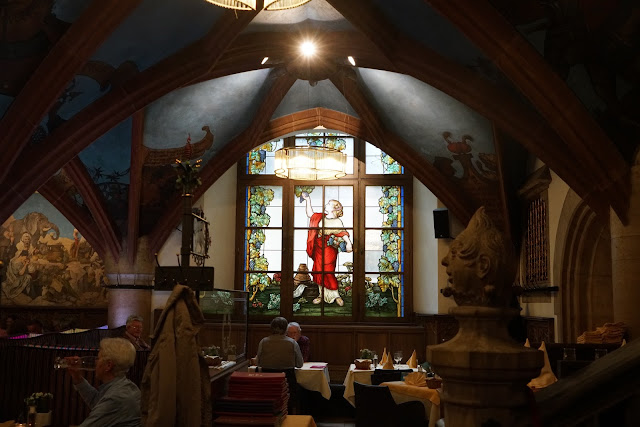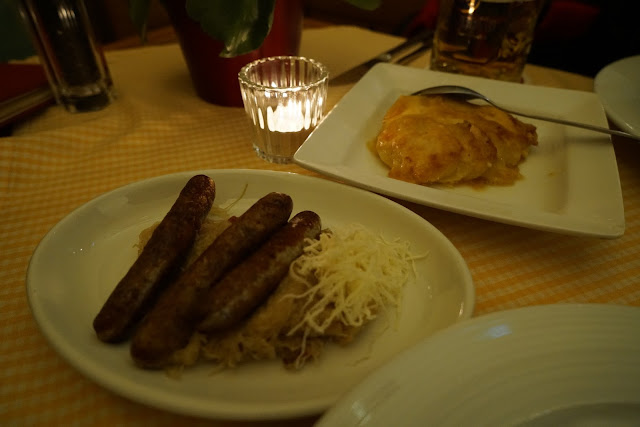
Germans love their trees. Wherever possible, they'd keep them, even in the middle of a clump of buildings. Here's one, right in front of the house and growing as tall as the house itself.
This is Munich Neues Rathaus (New Town Hall) at the very heart of the old town, Marienplatz built in revival Gothic style between 1867 and 1874, with some 400 rooms accomodating the town council, the mayor's office and local government, its 300-foot façade decorated with statues of all the members of the ruling Wittelsbach family. At the center of the main faççade above the guard house is the equestrian statue of Prince Regent Luitpold, surrounding him are the first four Bavarian kings.Its first floor has a big balcony facing the Marienplatz which is used for large festivals like football championships or concerts during the Weihnachtsmarkt.
Its 85 meter tower houses a glockenspiel which displays 32 life-size toy figures going round and round every day between 11 a.m and noon and again at 5 p.m. when the clock chimes.
The toy figures appear at two levels, enacting two stories from the 16th century. The one on top re-plays the marriage of Duke Wilhem V (who founded the Hofbräuhaus close to the plaza) with Renata of Lorraine with a celebratory joust between a knight on horseback (in blue and white) representing Bavaria, winning the joust against that from Lothingen (in red and white). After that, the figures on the level below would do the Schäfflertanz (the coopers' dance). According to legend, the coopers danced through the streets during the plague in Munich in 1517 to raise the spirit of those tormented by fear of death. Since then the dance has come to symbolize the townsfolk's perseverance and loyalty to authority through difficult times. The dance is now repeated in Munich once every 7 years and can be seen during Fasching (German Carnival), the next one being set for 2019. The show lasts about 10 minutes or so, depending on the tune being played out on the 32 tubular bells. At the end of the show, a very small golden rooster at the top of the Glockenspiel will chirp three times to mark the the end of the spectacle. The photo shows the king and the queen.
The celebrating guests

below the tower, the gaping tourist crowd.
One child soldier killing a dragon, the other a serpent right in the middle of the town square
Flowers below the monument
After the show, it's time for a meal, I had lunch at the Ratskeller at the cellar of the Town Hall, in business since the 1874, when the New Town Hall was inaugurated.
One of the windows with colored glass

Another window with colored glass
The walls had murals
A ceiling lamp in brass above my table
The drinks menu
then cream of potato soup with wheat bread and a Lowenbräu
I tried their famous pork chop; a very substantial and delicious meal which I could never finish. I skipped dinner that evening.


Various sauces and condiments: the soul of food.
A florist close by the restaurant

The tower of the Frauenkirche is now under repair
The toy museum at one end of the Marienplatz
This is the famous fish fountain which started life in the 17th century. In olden days, fish mongers used to place their fish here to keep them fresh.
According to customs, before an apprentice butcher is awarded the status of a master butcher, he has first to plunge himself into the water of this fountain with nothing but a sheepskin on his bare body and a bull's penis on his neck!
Another more plain looking fountain at a corner of Marienplatz just in front of the toy museum
The garden behind Marienplatz

German love flowers. You find flower shops or booths at the side of the pavement everywhere.
The toy museum: its front built like an organ: the
Germans love organ music. maybe that's how they had their first
experience of music. J S Bach certainly started out his long and productive life as a
composer as an organist

The wheel of fortune under the arch at the side of the toy museum
The toy museum from afar
Like other old European towns, buildings are often connected by a bridge with an arch to allow passing traffic
I always thought that there would be tri-cyle pedalist only in Asia. How mistaken was I!






































沒有留言:
張貼留言